
PHILADELPHIA (AP/ KYW Newsradio) — The Pennsylvania House of Representatives met hastily Monday to pass transportation funding legislation in a last-ditch effort to stave off deep SEPTA service cuts.
The Democratic-backed bill passed the chamber, 108-95, over the objection of nearly every Republican in the chamber.
The nearly $1 billion bill has the support of Democratic Gov. Josh Shapiro and includes funding for highways, too. But it faces an uncertain future in the Republican-controlled Senate, where the GOP majority has resisted increasing aid for transit.
House Democrats have passed similar legislation four times prior, but the Senate shot it down each time. To make dedicated transit funding more palatable to the state Senate this time, House Democrats included several GOP asks, like increased funding for rural roads and highways and greater state oversight over SEPTA. Despite those additions, all but seven House Republicans opposed the bill, including Bucks County’s Craig Staats and Kristin Marcell, and Montgomery County’s Donna Scheuren, which doesn’t bode well for the bill’s chances.
The Senate is expected to convene over the bill on Tuesday.
The bill increases aid for transit agency operations across the state by $292 million, or about 25% more, with the lion’s share of the money going to SEPTA.
SEPTA has said it cannot keep waiting for more aid before it makes cuts, which it said would be more drastic than any undertaken by a major transit agency in the United States.
SEPTA said it must receive state funding by Aug. 14 to stave off 20% service cuts that would take effect on Aug. 24, one day before the start of school in Philadelphia. With a schedule change, it usually takes SEPTA three weeks to prepare data feeds and work schedules for drivers, but it’s compressing that process down to 10 days to buy as much time as possible for a state transit deal.
Republican state Rep. Kerry Benninghoff argued there’s no guarantee that funding will fix SEPTA’s issues, adding that it “surely won’t happen” by SEPTA’s Aug. 14 deadline.
“No bill today being passed is going to stop that on the 14th,” he said. “I don't know if that date’s arbitrary or not, but the system here will not allow that to happen timely.”
What is SEPTA threatening to cut?
The first round of service cuts includes 32 bus routes cut, 3,000 bus stops eliminated, 16 routes shortened, no sports express service, and less frequent service on the buses and trains that will continue to run. Midday Regional Rail trains would run every two hours.
SEPTA, the nation’s sixth-largest public transit system, has warned that it will cut half its services by Jan. 1, 2026, and be unable to provide enhanced service for major tourist events next year. Those include FIFA World Cup matches in Philadelphia, events surrounding the celebration of the nation’s 250th birthday, Major League Baseball’s all-star game, the PGA Championship, and NCAA March Madness games.
The deadline push comes after two years of stalemate, amid transit struggles nationwide with rising costs and lagging ridership.
Under the plan, fares will then rise by 21.5% on Sept. 1 and, soon after, the agency will impose a hiring freeze. It will carry out another service cut on Jan. 1 that will mean that it will have eliminated half its current services, SEPTA said.
Democrats say shoring up public transit agencies around the state is critical to the economy and making sure people can get to work, school and medical appointments. Republicans have objected that transit agencies need to become more efficient, highways need more state funding, and transit riders should pay higher fares.
Transit agencies in Pittsburgh and elsewhere around Pennsylvania also say they are making cuts or raising fares, or both.
